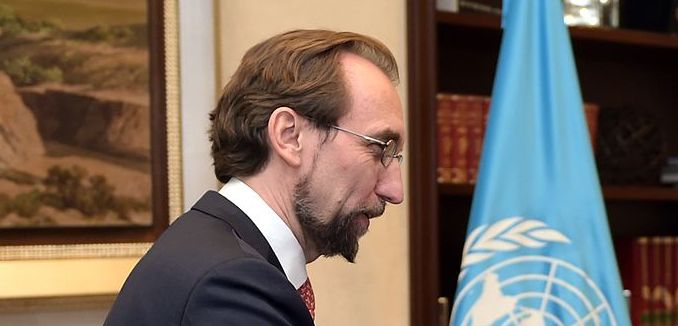The United Nations’ top human rights official called the hanging of up to 20 Kurds by Iran last week a “grave injustice” that followed a dubious judicial process.
According to Iranian state media, the executed Kurds were suspected of orchestrating attacks on security forces and of killing two Sunni Muslim clerics, Reuters reported. However, human rights groups have warned that the confessions exacted from the condemned may have been forced.
“The application of overly broad and vague criminal charges, coupled with a disdain for the rights of the accused to due process and a fair trial have in these cases led to a grave injustice,” Zeid Ra’ad Al Hussein, the UN’s high commissioner for human rights, said in a statement on Friday. He added that most if not all the men were reportedly Sunni Kurds, a minority group in Iran.
One of those executed, Shahram Ahmadi, was allegedly beaten and forced to sign a blank piece of paper on which a false confession was later written, Zeid said.
Zeid also condemned last month’s hanging of Hassan Afshar, 19, who was convicted by Iranian authorities of engaging in “forced male-to-male anal intercourse” while still a minor. Afshar, who denied the accusation, had no access to a lawyer and was sentenced to death after a rushed investigation and prosecution, according to Amnesty International.
“The execution of juvenile offenders is particularly abhorrent and I urge Iran to respect the strict prohibition under international human rights law against this practice,” the commissioner said.
There were at least 966 executions in Iran last year, the highest total in ten years. Over the past decade, the number of executions in Iran has climbed and reached record yearly highs in each of the three years of President Hassan Rouhani’s tenure. Last year, Shaheed called the execution rate during Rouhani’s term in office “an unprecedented assault on the right to life.” Rouhani’s appointed Justice Minister, Mostafa Pour-Mohammadi, earned the nickname “minister of murder” for having overseen the summary executions of tens of thousands of dissidents in the late 1980’s.
In Should the U.S. Take Iran’s Human Rights Problem More Seriously?, which was published in the April 2015 issue of The Tower Magazine, senior editor Ben Cohen highlighted Shaheed’s efforts to document Iran’s human rights situation, which has worsened since the election of Rouhani as president in 2013.
[Photo: Presidencia de la República Mexicana / Flickr ]




